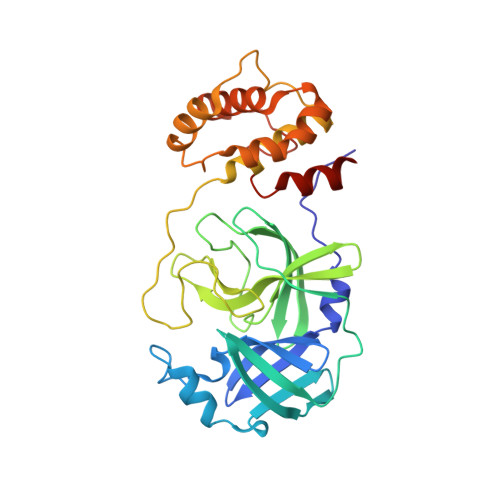Discovery and Crystallographic Studies of Nonpeptidic Piperazine Derivatives as Covalent SARS-CoV-2 Main Protease Inhibitors.
Gao, S., Song, L., Claff, T., Woodson, M., Sylvester, K., Jing, L., Weisse, R.H., Cheng, Y., Strater, N., Schakel, L., Gutschow, M., Ye, B., Yang, M., Zhang, T., Kang, D., Toth, K., Tavis, J., Tollefson, A.E., Muller, C.E., Zhan, P., Liu, X.(2022) J Med Chem 65: 16902-16917
- PubMed: 36475694
- DOI: https://doi.org/10.1021/acs.jmedchem.2c01716
- Primary Citation of Related Structures:
8B56 - PubMed Abstract:
The spread of SARS-CoV-2 keeps threatening human life and health, and small-molecule antivirals are in demand. The main protease (M pro ) is an effective and highly conserved target for anti-SARS-CoV-2 drug design. Herein, we report the discovery of potent covalent non-peptide-derived M pro inhibitors. A series of covalent compounds with a piperazine scaffold containing different warheads were designed and synthesized. Among them, GD-9 was identified as the most potent compound with a significant enzymatic inhibition of M pro (IC 50 = 0.18 μM) and good antiviral potency against SARS-CoV-2 (EC 50 = 2.64 μM), similar to that of remdesivir (EC 50 = 2.27 μM). Additionally, GD-9 presented favorable target selectivity for SARS-CoV-2 M pro versus human cysteine proteases. The X-ray co-crystal structure confirmed our original design concept showing that GD-9 covalently binds to the active site of M pro . Our nonpeptidic covalent inhibitors provide a basis for the future development of more efficient COVID-19 therapeutics.
Organizational Affiliation:
Department of Medicinal Chemistry, Key Laboratory of Chemical Biology, Ministry of Education, School of Pharmaceutical Sciences, Shandong University, Ji'nan250012, China.

















